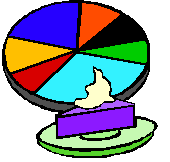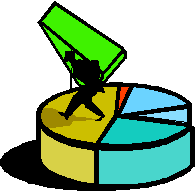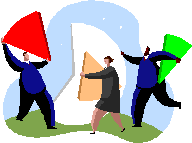
Notes on Political Economy (ECON 262)
Public Choice Economics: When economics is applied to politics, certain theories emerge about resource allocation and the political process in general.
Remember our model: Rules - Incentives - Actions - Outcomes
The rules in place will effect the outcomes we see in the market process. But what about the process by which many of these (legal) rules come about? This is the political process. Does the same model apply to that process as well? Yes, it does.
In other words, politicians and bureaucrats are just like everyone else - they act in their own self interest. Therefore, they also will change their behavior if they are faced with different rules. And those who become engaged in the political process (businesses, special interest groups, etc.) do so because the rules give them the incentive to do so. If the rules change - this behavior changes as well.
Basic assumption that can distinguish economic theory from political science (or the "benevolent despot model"): Self-interest axiom applied to the political arena. People, acting within the political or government realm are no different from anyone else - everyone acts purposefully - in their own self interest. Remember, acting in order to push a political ideology or agenda is self-interested behavior. But realistically -- what happens?
Right now - the rules allow a lot of "co-mingling" between the market process and the political process. The outcomes of that co-mingling are much of what we see today.
If we look at each process separately (that is without co-mingling):
There are two basic ways of allocating scarce resources:
markets (prices, profits and losses) or
politics (special interests, government bureaus, etc.).
(Note - tradition could be a third way of allocating resources).
What are the differences? Let's look at the Pie or Wealth within the economy.
The pie means productivity of anything we value or wealth (not just money, be careful).
Markets and the pie: Markets create the pie generally speaking.
Note - markets can only operate effectively if there are private property rights, free trade and the rule of law - and today, government is typically the entity that is supposed to enforce those rules - however, some believe that government is not necessary to enforce those rules - especially because those rules rose spontaneously without government - just something to think about.

Politics and the pie: Politics use a lot of the pie and distribute the pie generally speaking.
Note: It is difficult to talk about the pie without talking about markets because markets are generally speaking the productive sector of society - therefore the pie would be very different without them.

Is it possible for the political process to increase the size of the pie?
Why do most economists think that it is not probable? The two differences are knowledge generation (trial and error - and what we learn from it) and incentives.
Let's look at some of the theories that have been developed by public choice economists (with respect to democracy - generally speaking). Remember the self interest assumption!
What is democracy (generally speaking)?
Why is considered to be the "best" form of government (according to many)?
Problems with democracy:
1. Logrolling:
Pork Barrel Spending:
Boondoggle: A government project that is considered a useless waste of both time and money, yet is often continued due to political motivations.
2. Rational ignorance
3. Fiscal illusion
4. Special interest groups (legislation)

http://www.opensecrets.org/industries/index.php
Rent seeking and waste (very large problem in many countries):
Define economic rent:
Define rent seeking:
Why is rent seeking wasteful?
How does rent seeking change the political outcomes in democracy? Relate to special interest groups.